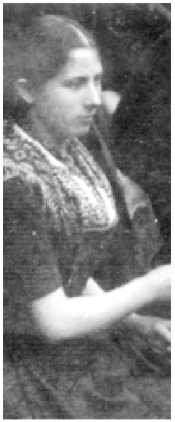Susanna Helena Patursson
| Helena Patursson | |
|---|---|

Helena Patursson as young lady in 1889 at the premiere of her play Veðurføst.
|
|
| Born | August 27, 1864 Kirkjubøur, Faroe Islands |
| Died | December 15, 1916 (aged 52) Kirkjubøur |
Súsanna Helena Patursson (27 August 1864 in Kirkjubøur – 15 December 1916 in Kirkjubøur) was a Faroese actress and writer, and the first political feminist in the country, particularly stressing the need for all Faroers to be able to write and learn Faroese properly. She also wrote the first play in the Faroese language. Her brothers Sverre Patursson and Jóannes Patursson were also well-known.
Helena Patursson is the daughter of the king's farmer Poul Peder Pedersen and Ellen Cathrine Djonesen. She grew up on the king's farm Kirkjubøargarður, where she got private lessons together with her brothers. Later she went to Copenhagen, where she learned piano and handiworks. She worked there as paralegal until 1904, when she returned to the Faroes.
Like her brothers Helena Paturson was an activist, ever since the Christmas Meeting of 1888, where the nationalist movement was founded. Her activities were mainly addressed to women. In 1889 wrote she the first play in Faroese, Veðurføst (feminine form of veðurfastur = unable to move from a place because of weather conditions, "weather-stuck"), from which unfortunately only fragments are preserved. It is about women's role in the national awakening and teaching Faroese at home, which had at this time no official status as a language.
She also wrote in the papers Føringatíðindi (Faroe Periodical) and Fuglaframi (Fowl Forth = the Faroese people's furtherance) which belonged to her brothers, Jóannes and Sverre. In Copenhagen she organised a women's union, and in 1896 persuaded the Faroese Association there to affiliate with women.
Back in the Faroes, Helena Patursson founded and wrote her own periodical Oyggjarnar (the Islands), which was not only the first periodical mainly intended for Faroese women, but also at its time (1905-1908) was the only periodical in Faroese language. Thus Oyggjarnar has a large importance in the history of the Faroe Islands. Every issue was four pages long, it came out weekly, and it originally sold for 1,5 crowns for a half-year subscription but later the cost lessened.
...
Wikipedia
